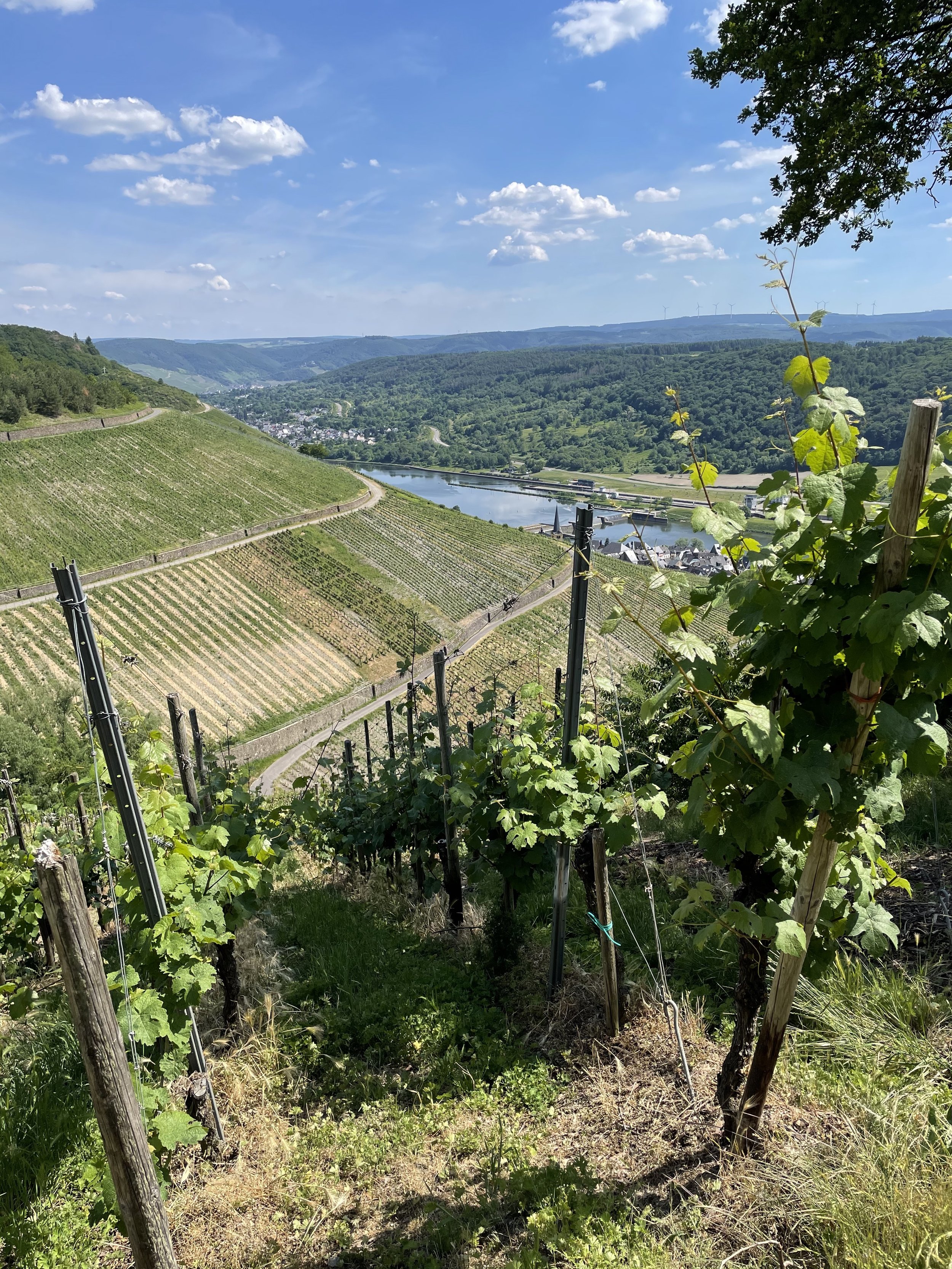Heinrichshof
Heinrichshof, owned and run by brothers Peter and Ulrich Griebeler since 2014, is one of a handful of Mosel properties with a primary focus on making dry (Trocken) Riesling. While the steep slopes above the Mosel have traditionally been dedicated to sweeter styles, Heinrichshof is adapting to a new era of ripeness, and is making dry Riesling of great energy and detail, without any austerity, all for very attractive prices.
In addition to the dry whites, the Griebler brothers also produce beautiful Kabinett and Auslese Riesling, showcasing the piercing purity and lightness of touch of these traditional Mosel styles.
The Wines
Among the dry wines, we offer the two most important Riesling wines of the estate: the estate Riesling (Zeltinger Dry Riesling), and the top dry Riesling, the Sonnenuhr Rotlay. While the Rotlay is distinguished by its considerable complexity and beauty, in both wines the style is the same: subtle aromas, delicate, pure fruit, dry, with fine acidity and understated, cool, complexity. Thanks to their lightness, the wines are dangerously easy to drink, but they also reward meditation as they quietly unfurl their secrets. We also offer the Pinot Blanc, a dry example of this underrated variety. On these steep slate slopes, the variety offers freshness and body, with a gorgeous creamy texture and generous fruit.
Zeltinger Dry Riesling Tech Sheet 2024 | Label
Sonnenuhr Rotlay GG Dry Riesling Tech Sheet 2023 | Tech Sheet 2024 | Label
Goldtröpfchen GG Dry Riesling Tech Sheet 2024 | Label
Pinot Blanc Tech Sheet 2024 | Label
Pinot Blanc Reserve 2022 Tech Sheet | Label
Among the off-dry and sweet whites, we offer two classic examples: the playful, light, charismatic Kabinett; and the complex, ageworthy Auslese.
Himmelreich Kabinett Riesling 2023 Tech Sheet | Label
Sonnenuhr Auslese Riesling 2023 Tech Sheet | Label
Located in the famous Mosel village of Zeltingen, in the heart of the valley’s most important stretch of vineyards, Heinrichshof works 9ha (22 acres) of vines, largely planted to Riesling, but with a handful of other varieties too. Peter and Ulrich’s principal vineyard sites are all in the village of Zeltingen: Himmelreich, Schlossberg and Sonnenuhr. The Sonnenuhr vineyard vineyard runs into the next village, Wehlen, where it produces wines including JJ Prüm’s famous Wehlener Sonnenuhr. Heinrichshof’s beautiful labels show the vineyards of Zeltingen above the village (from left to right: Himmelreich, Schlossberg and Sonnenuhr).
Viticulture is by hand and relies on minimal chemical usage, and the brothers are working towards organic conversion. For the dry wines, season-long viticultural practices such as de-leafing in the fruit zone targets greater ripeness and berry health with balanced acidity. Before harvest the berries are tasted to ensure that fruit and acidity are balanced, and compared to Kabinett or Auslese sweet wine grapes, a deeper yellow color of the berry at harvest is sought: this indicates greater ripeness. Finally, the acidity must not be aggressive. In the cellar, long, slow fermentation and aging on the lees soften the wines while also contributing the subtle complexity which is a hallmark of the estate. The Kabinett and Auslese wines always include some shrivelled, botrytis-infected berries.
All Heinrichshof wines are:
Vegan / suitable for a vegan diet;
Certified Sustainable: “Fair'n Green” is a comprehensive sustainability seal focusing on economic, ecological, and social aspects in viticulture with a special emphasis on biodiversity, environmental protection, climate action, and sustainable plant protection;
Estate grown and bottled.

Heinrichshof vines in Zeltinger Himmelreich, very close to the new Mosel bridge

Zeltinger Schlossberg vineyard

Slate soils typical of the Mosel

Zeltinger Sonnenuhr, immediately above the Mosel

Zeltinger Sonnenuhr. The village on the other side is Wehlen

Zeltinger Sonnenuhr from the river


